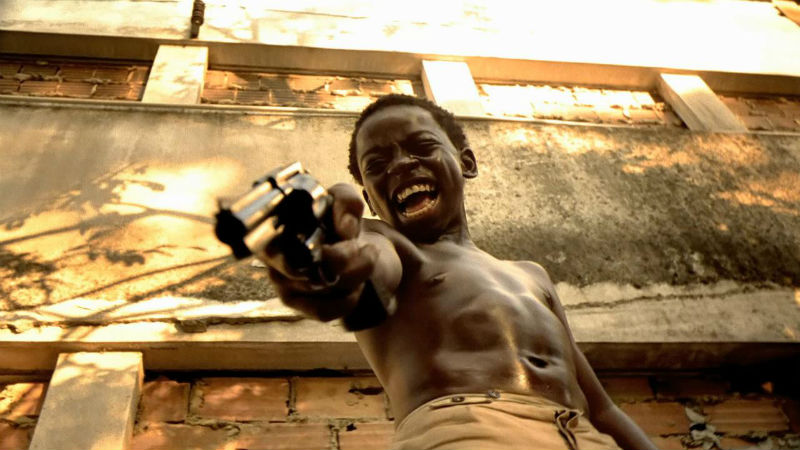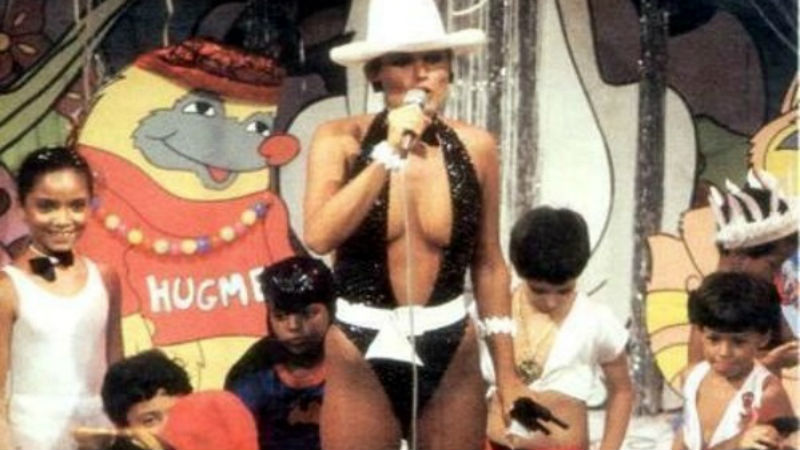




The largest country of South America is living a very dramatic and tragic moment. The country saw a coup d’état last year, and the illegitimate government – which enjoys approval ratings close to 0%) has since implemented a series of extremely unpopular and Draconian ultra neo-liberal measures, including freezing public spend in education and healthcare for 20 years, raising retirement age to 50 years of employment and cutting workers’ rights to level in many ways analogous with slavery. The country is now deeply polarised, confused and the prospects are far from rosy. There are very few reasons to smile.
Bingo: The King of the Mornings is one of these recons. This outstanding movie is here to make people smile and indeed laugh. This is one of these films that supersedes political differences, and speaks to audiences everywhere in the ideological spectrum. It’s also a film that emphasises the importance of artistic freedom at at time when reactionary pundits in Brazilian are demanding censorship in museums, theatres and so on (which this BBC article explains in a little more detail). Its importance cannot be overstated.

Rezende, who’s an experienced film editor with the likes of City of God (Fernando Meirelles, 2002), The Motorcycle Diaries (Walter Salles, 2004) and the new Robocop (Jose Padilha, 2014) already under his belt, has come up with an impeccable directorial debut. Bingo: The King of the Mornings is a partly fictionalised account of Arlindo Barreto’s life, Brazil’s first Bozo (the American TV clown). It’s a story full of nostalgia, swagger, sensuality and also the more profound topics of fall from grace and failed fatherhood.
Our editor Victor Fraga caught with the 42-year-old Brazilian filmmaker as he visited London in order to promote his film. So we talked to him about what made his film so successful in Brazil, how he feels about his film getting a theatrical release in the UK, Brazilian sensuality, stereotypes, artistic freedom and much more. Check out his dirty answers:
Victor Fraga – Very few Brazilian films saw a theatrical release in the UK in the past few years, except for Aquarius (2016) and Neighbouring Sounds (2011), both by Kleber Mendonca Filho. That’s less than a film a year. How do you feel about joining such a selective group?
Daniel Rezende – Of course I’m really, really happy and proud. We worked very hard to make a movie that represents us on the screen and also a film that’s not the kind of Brazilian film most people expect to see. This is not a socio-political drama, showing the economic problems of our country. And we have a lot of such problems. International audiences will probably be surprised to see our pop culture, and how we use our swagger in order to solve problems and deal with everything.
VF – As you pointed out, a lot of Brazilian films showing out here dealt social problems, such as poverty and violence. They include Central Station (Walter Salles, 1997), City of God (Fernando Meirelles, 2002; pictured below) and Elite Squad (Jose Padilha, 2007). Yet Bingo and last year’s Aquarius seem to be moving in a different direction. Is Brazil changing? Or is the way Brazil is perceived abroad changing?

DR – First of all, putting my film in the same group as Aquarius makes me very happy and proud. We are definitely changing. But also our cinema had a break for nearly 20 years. Almost no films at all were made in the 1980s and 1990s. Then came Central Station in 1997. City of God was a landmark. And I think audiences now are demanding more diverse movies.
After our cinema returned to life in the late 1990s, we had the same artists as before. Then a lot of advertisers started making films, including Fernando Meirelles and Walter Salles. A lot of directors and DOPs were making adverts because they had to survive in these 20 years. Now we are seeing an entirely new generation, who are changing the game again. So we have Fernando Coimbra who made this amazing movie called Wolf at the Door (2015). These people are thinking of cinema in a different way, moving away from socio-political dramas.
VF – Let’s talk about the Brazilian swagger. Your film highlights cultural differences in Brazil and the US. This exuberant sensuality is often frowned upon in other places. Do you think that this in an asset or a handicap, suggesting an image of sexual availability and promiscuity?
DR – I think that’s both. That’s in our culture, and our way of doing things. It’s indeed very controversial. Even though we have Carnival, we are a very conservative, Christian country, specially nowadays. Well, the entire world is turning more conservative, moving backwards. One step forward, two steps back. I don’t think this sensuality is linked to promiscuity. But I also think that we crossed a couple of lines that shouldn’t have crossed in the 1980s, and we have now moved forward. I don’t think a woman showing her boobs to kids is a good thing [in reference to the TV presenter Xuxa, pictured below, who’s called “Lulu” in Bingo).
My movie does not make any judgments of the subversions of the 1980s, when everything was exaggerated. What my film does is: “look, that’s how we were back then”. I personally have a lot of criticism about the politically incorrect back then but also nowadays.
VF – Brazil is seeing a huge reactionary backlash, and art is being subjected to censorship. The performance of La Bete in a museum being described as “paedophilia”. Your film also deals with a child seeing two adults having sex. Do you think that the 1980s were more liberal then now, and that censorship could become more strict in the future?

DR – The world is going down a very conservative path. Unfortunately, things are getting worse, particularly in Brazil. People are twisting ideas into their political agenda. In my film, Augusto takes his kid to a soft porn (pornochanchada) set, that was very common back then. We opened the film with this scene because we wanted to emphasise the paradox between doing porn and having to protect your son. He’s irreverent and subversive, but he’s also a father.
VF – Did you encounter any censorship? Or any negative reactions?
DR – Not at all. Not even when I was making the movie. People were actually happy that we were making a film to talk about an era which was less Big Brother. There was no one controlling you back then: “you can say this, but can’t say that”. We could only do that because we made no judgments of the character.
VF – Bingo humiliates a child live on TV. Did this actually happen in real life?
DR – No, not that bit. But a clown is subversive, you know? We took Vladimir Brichta [who plays Augusto/Bingo] to perform in a real circus, without anyone knowing, and he had to make people laugh. The entire crew was in the audience. A clown then chose me to go to the ring, and he somehow humiliated me. And not in a bad way. That’s what clowns do. When you put on the smallest mask in the world, the red nose, you are allowed to do anything you want, and nobody can criticise you. I would not use the word “humiliate”.
VF – You have changed a lot of names in the film Lulu, Rede Mundial and so on. And of course, the very title character. Were there trademark issues in all of the the cases or was it for the sake of jest?

DR – We wanted to have creative freedom in our film, so we changed most of the names. Including Arlindo Barreto, who became Augusto. Except for Gretchen [The Brazilian Bum Queen, pictured above]. And that’s because we wanted to have at least one real thing to which people could relate. We went after her, we asked her and she loved the idea! She allowed us to use her name!
VF – Did the real Gretchen also have sex with the fully-clad clown in a toilet cubicle?
DR – No, that didn’t happen. But Arlindo and Gretchen did have a relationship for a while, and we were allowed to make a couple of changes.
VF – Please tell us about your future projects. You are now working on a another film with a topic related to childhood, Monica’s Gang. How did that happen?
DR – I am dealing with my very own childhood much more than anything else! I grew up reading these cartoons (Monica’s Gang), and it’s part of who I am, and of our culture. I want to deal with Brazilian culture, and understand why we are the way we are. Monica’s Gang will be about friendship and sticking together. I want to continue to deal with humanity in my films.














